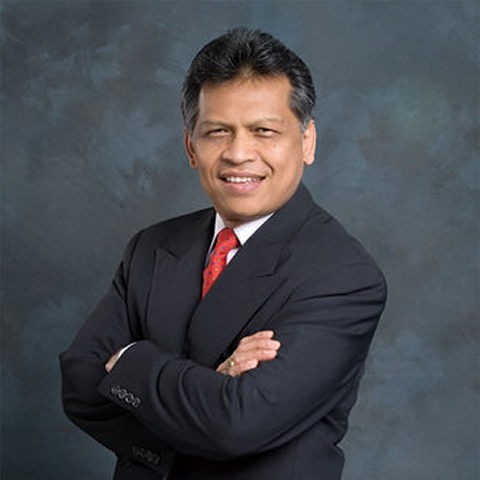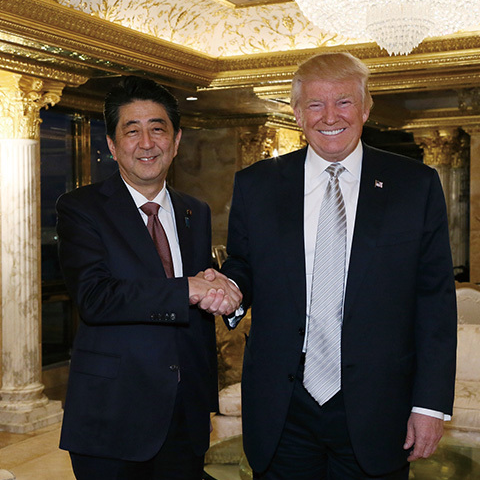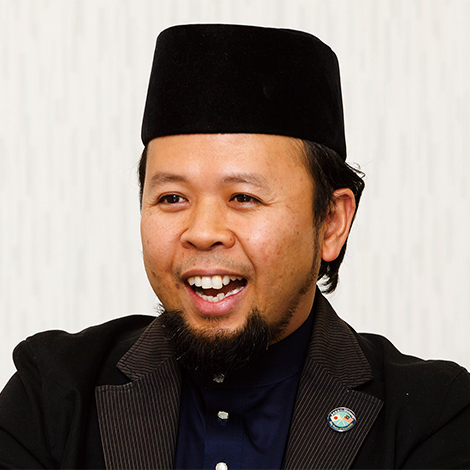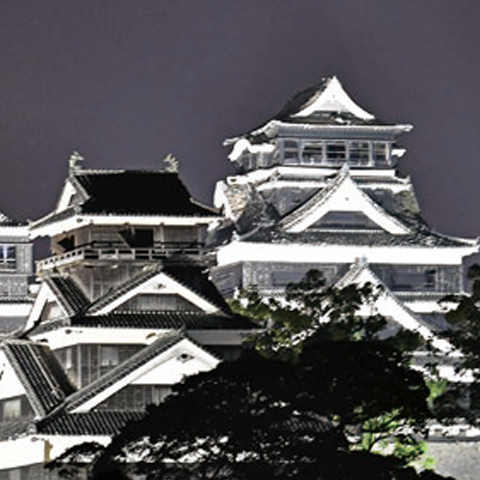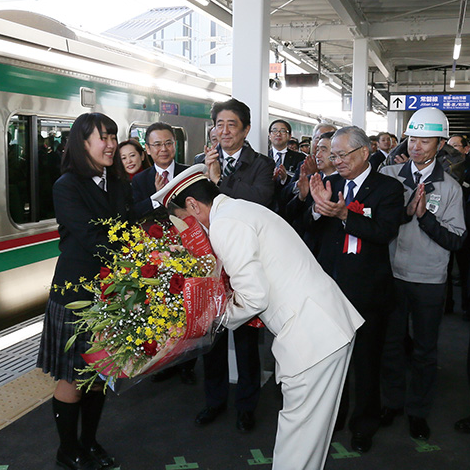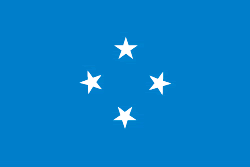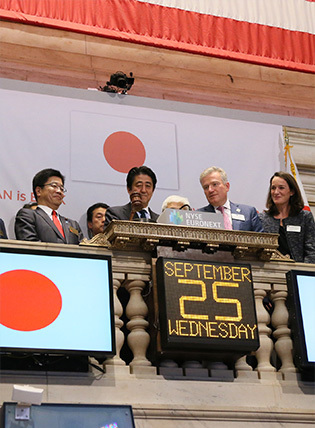Address by Prime Minister Shinzo Abe at the New York Stock Exchange 25 September 2013 New York
Ladies and gentlemen, I am grateful to have this opportunity to speak to you today.
Wall Street, an entity that moves the global economy-- when I hear the name, my mind turns to Gordon Gekko, played by Michael Douglas.
In the original film in 1987, the words "Nikkei Index" appear. Japanese businessmen also take the screen and the film reminds us of the era in which the Japanese economy was regarded as a juggernaut.
However, in the 2010 sequel, the investors that appear are Chinese and it is not Wall Street but London where Gordon amasses his wealth. Japan is conspicuous only in its absence. Just as the title, "Money Never Sleeps", indicates, the principle that money flows to wherever the profits are is decidedly severe.
It is certainly true that after the bursting of its bubble, from the 1990's Japan was mired in almost 20 years of deflation and the economy was sluggish. But today, I have come to tell you that Japan will once again be a country where there is money to be made, and that just as Gordon Gekko made a comeback in the financial world after 23 years of absence, so too can we now say that "Japan is back".
Tomorrow is pitcher Mariano Rivera's last game at Yankee Stadium. I am really pleased that on this day which will remain in the memories of New Yorkers forever, I will be able to share in this moment here in the same city.
Even now, at age 43, Rivera has that one pitch -- that sharp-breaking cutter -- that every batter finds entirely unhittable. I am convinced he is the best closer anywhere in the world.
There is likewise no need to go to extraordinary lengths to find a scenario in which Japan reemerges. I believe that, just like one of Rivera's cutters, Japan will be able to revive as long as it unleashes its intrinsic potential.
Let me illustrate this using something familiar to us all. Let's talk sushi for a moment. New York has any number of authentic sushi bars.
I'm guessing that many of you have had the chance to experience the exquisite combination of rice, fish or other ingredients, hot wasabi horseradish and soy sauce, accompanied by sake to drink. It is all of these in combination that give rise to such superb harmony. When any of those are lacking, the entire experience comes up short. Japanese food is therefore a highly sophisticated system.
I travel overseas once a month. I have Japan's business leaders accompany me whenever possible and together we have been marketing Japan's potential. In particular, we have been bringing Japanese food with us and having our counterparts overseas sample them for themselves. Whether it's sushi or tempura, we never fail to have a tremendously long line at the counter.
Originally, both sushi and tempura were types of fast food eaten by the common folk at roadside food stands more than 200 years ago in Edo, now known as Tokyo. I have a dream that someday, even here in New York, we'll see sushi and tempura carts lined up next to the hot dog vendors at the corner of 40th Street and Fifth Avenue.
Japan's trains also form a world-class system. Our Shinkansen, or bullet trains, travel at the lightning-fast speed of 205 miles per hour and they are quiet as well as comfortable. Ever since the Shinkansen began operations in October 1964, never once has there been a single injury, let alone a fatality caused by the train service, giving it a superior safety record that people all over the world inquire about.
One of Japan's Shinkansen operators boasts a new rail system that uses superconducting magnetic levitation technology. It has already been tested multiple times in Japan with passengers aboard, running at a top speed of 311 miles an hour, making it the fastest train in the world.
Making use of this technology would connect New York and Washington, D.C. in less than an hour. It would free people from the congested roads that frazzle their nerves while saving not only 443,000 gallons of gasoline but also 682,000 hours of time that are now wasted annually. Compared to airplanes and automobiles, it would save time while cutting carbon dioxide emissions. It is truly a dream technology.
In Japan, preparations are already well underway even now towards opening the Tokyo to Nagoya section. But before that, let's first connect Baltimore and Washington, D.C. I have already presented President Obama with a proposal to do exactly that.
You live in a country that is very lucky indeed, enjoying tremendous economic power through shale gas and shale oil, which will also lower your fossil fuel costs. Japan is not so fortunate. But it is exactly because we lack this good fortune that we have become masters of innovation.
Compared to 1973 when the Fourth Middle East War erupted, Japan's energy efficiency has improved by some 40 percent. Japan's petroleum-equivalent energy consumption per thousand dollars of GDP is now a mere 0.11 tons, in contrast to 0.17 tons for the United States. China's is 0.6 tons, showing how Japan's highly advanced energy conservation technologies outperform the rest of the field by a wide margin. Herein lies an opportunity for Japan to grow -- and an opportunity for you to invest.
Some 70 percent of the world's lithium-ion batteries for automobiles are made in Japan. Japan also makes the batteries in Tesla Motors' electric vehicles that are so popular here in the United States. Next-generation automobiles are -- to play on the famous phrase "Intel Inside" -- a case of "Japan inside".
Japan's LED lighting is also highly efficient, consuming less than one-fifth the electricity used by incandescent bulbs.
One provisional calculation asserts that if worldwide demand for 6.5 billion incandescent bulbs were replaced with Japanese LED bulbs, the energy conserved would exceed the output of 200 new nuclear power stations.
In addition, Japan will also continue to make contributions to the world in the area of safety technology for nuclear reactors. There will be no abandoning them. I believe that it is incumbent upon us to overcome the accident in Fukushima and contribute to the world by having the highest level of safety in the world.
In the waters off Fukushima, a power-generating technology of the future is now on the verge of blooming. That is technology for "floating" off-shore wind power. Currently, there exist only 2MW-class wind turbines anywhere in the world.
But we are now working to develop 7MW-class wind turbines off the coast of Fukushima. Its colossal wind turbines some 200 meters high generate electricity despite the roll of the waves. This will be a massive project that brings together concerted efforts from around Japan, with internationally respected steelmakers, heavy industry manufacturers, electronics industry manufacturers, and others participating.
Japan's energy technologies are a mass of sheer potential. That is exactly why I will push forward with reforms to the electric power system. In order to accelerate this kind of dynamic innovation still further, I will bring about a major transformation of Japan's energy market by liberalizing the electric power sector.
Various regulations stand in our way as we seek to take on new challenges. For example, there are numerous regulations that have to be cleared when developing and then demonstrating fuel cells. This makes originality and ingenuity impossible.
I am thinking of creating a new structure under which companies wanting to demonstrate frontier technologies would operate under zero regulations, provided they independently take measures to ensure safety.
I consider regulatory reform to be the key change that will break through obstacles in the private sector's way in every area.
There may be some skeptics wondering, "Will you really be able to pull off those reforms?" It is certainly true that over the last few years, Japan was the embodiment of "the politics that cannot decide".
However, this July, the people of Japan took a pivotal decision. They chose to do away with the deadlock that had resulted from the Upper and Lower Houses of our legislature being controlled by different parties, which is what had given rise to our "politics that cannot decide".
The ruling coalition that I lead succeeded in capturing a majority in both the Upper and Lower Houses. As the leader of the ruling parties, my decisions will most certainly be translated into action.
"Without action, there can be no growth". Action forms the very essence of my strategy for growth.
Just before I departed Japan, a baseball record was broken. The record of 55 home runs in a single season set by Sadaharu Oh in 1964 was eclipsed by Caribbean native Wladimir Balentien.
Here in New York, Ichiro set a magnificent record of 4,000 career hits in Japan and the United States. Foreign players are making their mark in Japan, while Japanese players are making their mark here in the U.S. The era in which the world is overparticular about borders and nationality is now a thing of the past.
Japan and the United States are part of the Asia-Pacific region, the growth center of the world. We share the values of freedom, basic human rights, and the rule of law and together we have developed our economies.
It is historically inevitable that our two countries would help to craft the Trans-Pacific Partnership Agreement, or "TPP".
Japan and the United States must lead the way forward to enable the negotiations to be concluded within 2013.
I very much hope to create a large market brimming with freedom and creativity within this Asia-Pacific region, working hand-in-hand with the United States.
Now, you might not know that I am also doing some blogging for the Japanese edition of The Huffington Post. I am scheduled to meet Ms. Arianna Huffington again tomorrow and her straight manner of talking is quite striking.
I understand that Arianna once said, "If 'Lehman Brothers' was 'Lehman Brothers and Sisters,' they might still be around".
She says that for men, "there is now a kind of sleep deprivation one-upmanship". She continues saying, "they think that they are so incredibly busy and productive, but the truth is they are not". According to her, such men typically fail to see the icebergs lurking just ahead.
Being a male myself, and as someone who had been working without any time to rest since I took office as Prime Minister, these words really struck home with me. This summer, with Ms. Huffington's words etched in my mind, I took some proper time off from my duties.
In any event, there is another great source of potential lying dormant in Japan, and that is the power of women.
The first woman ever to have a seat here on the New York Stock Exchange was a woman named Muriel Siebert, known by all around her as "Mickie". She achieved her seat on the Exchange 46 years ago. I am reminded of something she said.
She stated, "American business will find that women executives can be a strong competitive weapon against Japan and Germany and other countries that still limit their executive talent pool to the male 50 percent of their population".
As someone who demonstrated the validity of those words personally, Mickie served as a leader for women succeeding in the United States. I understand that she passed away just last month. I would like to express my deep respect for her activities as a pioneer until now and offer my prayers that she rest in peace.
I will transform dramatically the Japan that is grappling with the feeling of being caught in an impasse because it "still limits its executive talent pool to the male, 50 percent of its population".
In Japan, a great many women quit their jobs when they get married or have children, even though they are still very highly skilled and capable. I am convinced that if such women rise to action, Japan will be able to enjoy dynamic growth.
To make this a reality, we need to eradicate the words "children on the waiting list for childcare". We will prepare, as one massive effort, childcare arrangements for 200,000 children over this year and next, and arrangements for 400,000 children over a five-year period. As of this summer, we already succeeded in achieving our goal of preparing places for 120,000 children. To repeat, the hallmark of Abenomics is action.
The Japanese economy that now surrounds us is exceptionally good. Japan's economy recorded negative growth in the July to September period last year, before I took the reins of government, but in 2013 we have had positive growth of greater than 3 percent annualized for two consecutive quarters. This is not simply some financial phenomenon due to bold monetary easing. Production is up, consumption is up, and, at long last, capital investment is now up as well. The corporate mindset, which had been cowering in the corner as a result of our prolonged deflation, has most certainly been turning a corner.
If at this juncture I implement my Growth Strategy and bring into bloom the various types of potential that I mentioned earlier, then I can succeed in putting Japan back on a stable track to growth. This is the fundamental approach that I have taken in my three-pronged policy I call my "three arrows".
As soon as I return to Japan, I will be firing the next arrow within my Growth Strategy. I will assertively push through a bold tax reduction in order to stimulate investment.
Japan, as the third-largest economic powerhouse on the planet, will be back in full force again. Make no mistake, this will serve as a major driving force for global economic recovery. Allow me to add here that Japan imports a great deal of products from the United States. An upswing in personal consumption in Japan will most assuredly contribute to an expansion of U.S. exports.
To paraphrase Gordon Gekko, "How are we going to revive the global economy? Well, I'll tell you. Three words:
'Buy my Abenomics!'"
The Wall Street is always ahead of the curve. In light of that, now is your chance.
The other day in Saint Petersburg, President Obama gave me a hearty cheer of support as I flew off to Buenos Aires, some 23 hours away. As the sweet fruit of that and many other efforts, it was decided there that the 2020 Olympic and Paralympic Games would be held in Tokyo.
The Tokyo Olympics 49 years ago ushered in Japan's era of high economic growth. Japan is once again in the midst of great elation as we prepare for the Games seven years from now. It is almost as if Metallica's "Enter Sandman" is resounding throughout Yankee Stadium: you know how this is going to end.
I would like to end my address to you today paying my utmost respect to the magnificent closer, Mariano Rivera, for his fine achievements over so many years. Thank you so much.


























